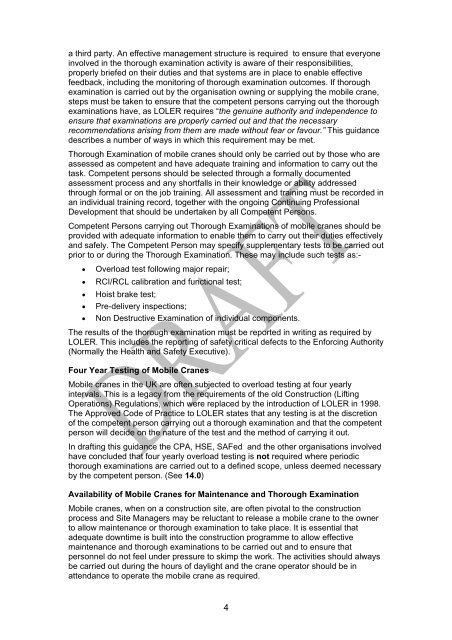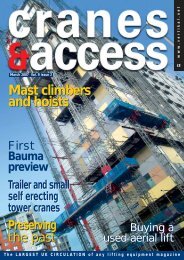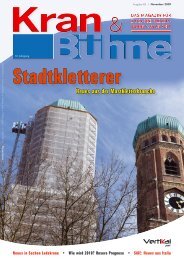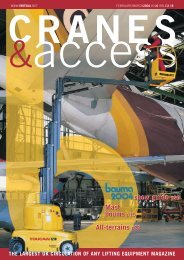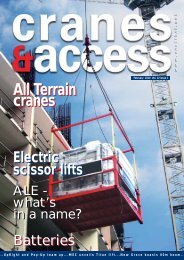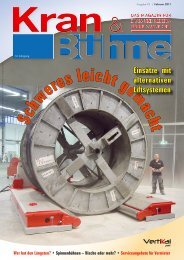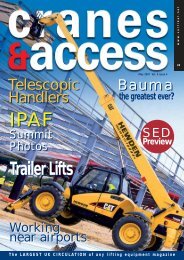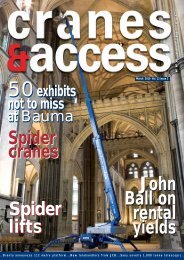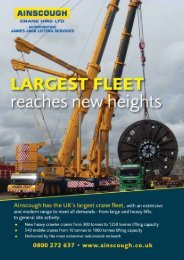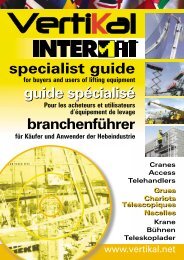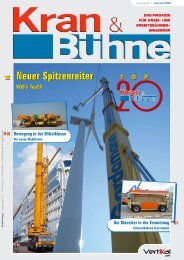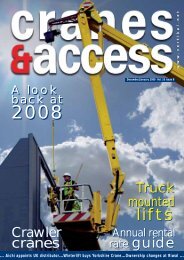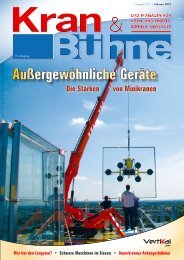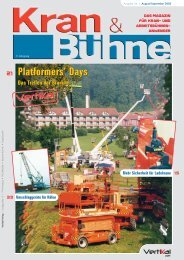Maintenance, Inspection and Thorough Examination of Mobile Cranes
Maintenance, Inspection and Thorough Examination of Mobile Cranes
Maintenance, Inspection and Thorough Examination of Mobile Cranes
You also want an ePaper? Increase the reach of your titles
YUMPU automatically turns print PDFs into web optimized ePapers that Google loves.
a third party. An effective management structure is required to ensure that everyone<br />
involved in the thorough examination activity is aware <strong>of</strong> their responsibilities,<br />
properly briefed on their duties <strong>and</strong> that systems are in place to enable effective<br />
feedback, including the monitoring <strong>of</strong> thorough examination outcomes. If thorough<br />
examination is carried out by the organisation owning or supplying the mobile crane,<br />
steps must be taken to ensure that the competent persons carrying out the thorough<br />
examinations have, as LOLER requires “the genuine authority <strong>and</strong> independence to<br />
ensure that examinations are properly carried out <strong>and</strong> that the necessary<br />
recommendations arising from them are made without fear or favour.” This guidance<br />
describes a number <strong>of</strong> ways in which this requirement may be met.<br />
<strong>Thorough</strong> <strong>Examination</strong> <strong>of</strong> mobile cranes should only be carried out by those who are<br />
assessed as competent <strong>and</strong> have adequate training <strong>and</strong> information to carry out the<br />
task. Competent persons should be selected through a formally documented<br />
assessment process <strong>and</strong> any shortfalls in their knowledge or ability addressed<br />
through formal or on the job training. All assessment <strong>and</strong> training must be recorded in<br />
an individual training record, together with the ongoing Continuing Pr<strong>of</strong>essional<br />
Development that should be undertaken by all Competent Persons.<br />
Competent Persons carrying out <strong>Thorough</strong> <strong>Examination</strong>s <strong>of</strong> mobile cranes should be<br />
provided with adequate information to enable them to carry out their duties effectively<br />
<strong>and</strong> safely. The Competent Person may specify supplementary tests to be carried out<br />
prior to or during the <strong>Thorough</strong> <strong>Examination</strong>. These may include such tests as:-<br />
� Overload test following major repair;<br />
� RCI/RCL calibration <strong>and</strong> functional test;<br />
� Hoist brake test;<br />
� Pre-delivery inspections;<br />
� Non Destructive <strong>Examination</strong> <strong>of</strong> individual components.<br />
The results <strong>of</strong> the thorough examination must be reported in writing as required by<br />
LOLER. This includes the reporting <strong>of</strong> safety critical defects to the Enforcing Authority<br />
(Normally the Health <strong>and</strong> Safety Executive).<br />
Four Year Testing <strong>of</strong> <strong>Mobile</strong> <strong>Cranes</strong><br />
<strong>Mobile</strong> cranes in the UK are <strong>of</strong>ten subjected to overload testing at four yearly<br />
intervals. This is a legacy from the requirements <strong>of</strong> the old Construction (Lifting<br />
Operations) Regulations, which were replaced by the introduction <strong>of</strong> LOLER in 1998.<br />
The Approved Code <strong>of</strong> Practice to LOLER states that any testing is at the discretion<br />
<strong>of</strong> the competent person carrying out a thorough examination <strong>and</strong> that the competent<br />
person will decide on the nature <strong>of</strong> the test <strong>and</strong> the method <strong>of</strong> carrying it out.<br />
In drafting this guidance the CPA, HSE, SAFed <strong>and</strong> the other organisations involved<br />
have concluded that four yearly overload testing is not required where periodic<br />
thorough examinations are carried out to a defined scope, unless deemed necessary<br />
by the competent person. (See 14.0)<br />
Availability <strong>of</strong> <strong>Mobile</strong> <strong>Cranes</strong> for <strong>Maintenance</strong> <strong>and</strong> <strong>Thorough</strong> <strong>Examination</strong><br />
<strong>Mobile</strong> cranes, when on a construction site, are <strong>of</strong>ten pivotal to the construction<br />
process <strong>and</strong> Site Managers may be reluctant to release a mobile crane to the owner<br />
to allow maintenance or thorough examination to take place. It is essential that<br />
adequate downtime is built into the construction programme to allow effective<br />
maintenance <strong>and</strong> thorough examinations to be carried out <strong>and</strong> to ensure that<br />
personnel do not feel under pressure to skimp the work. The activities should always<br />
be carried out during the hours <strong>of</strong> daylight <strong>and</strong> the crane operator should be in<br />
attendance to operate the mobile crane as required.<br />
4


